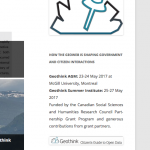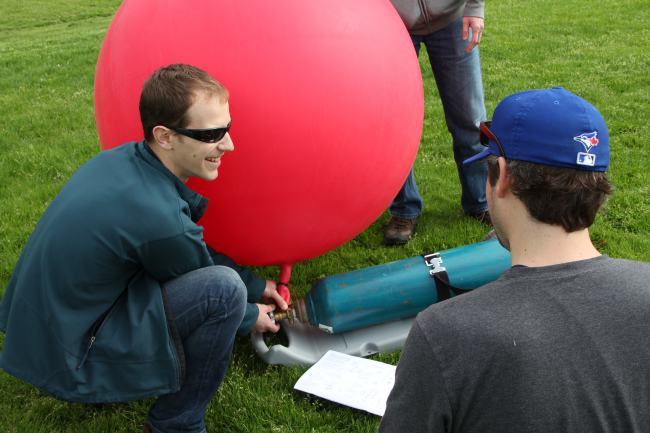By Drew Bush
You may have noticed a new banner gracing the front right portion of the Geothink.ca Web site starting last month. Click on it and it will take you to a key deliverable of this five-year partnership research grant funded by Canada’s Social Sciences and Humanities Research Council (SSHRC).
The Geothink Citizens Guide to Open Data was created by Curtis McCord and Dawn Walker, Geothink doctoral students in University of Toronto’s Faculty of Information, in collaboration with Geothink Co-Applicant Leslie Regan Shade, professor and associate dean for research in the faculty. It was first presented at Geothink’s 2016 Summer Institute at Ryerson University in Toronto when the duo were master’s students speaking on a panel.
“There’s actually still a big barrier where a lot of individual people aren’t using open data,” Walker said. “So we’re like in this moment, of saying, ‘Ok, open data has been lauded for all this potential promise.’ But it’s not exactly being used proportionally in the ways that are expected. From my experience, I’ve just seen a lot of companies or people who have very strong technical capabilities being able to work with open data. But there’s a lot of people who maybe have questions about their city or country that maybe open data can speak to. But like don’t—like wouldn’t even know to engage with it as a question you could ask of data. Or even know that open data would be a place they could go look to see.”
“These sorts of guides kind of help think about what those bridges could be,” Walker added. “And [they] address some of the literacies and capabilities required to even start to understand that you can ask questions that open data can answer.”
The Guide’s goal is to “provide citizens with tools to understand what makes up open data (OD), how it can be used in their communities, and where to find it.” Set up similarly to a Wiki page with drop-down menus, it consists of four sections on the right-hand bar entitled “Citizens Stories,” “Citizen Guide,” “Additional Resources,” and “About this Guide.”
The home page for the Guide notes that “People across Canada use technology that makes use of data as part of their daily lives” and increasingly are “starting to think about creative ways that this technology and data can be used to address issues they face in their communities and cities.” It adds that civic technology constitutes instances where “citizens come together to identify problems in their society or their community and solve them with data, computers, or expertise. Many kinds of data and their uses come up when we talk about open data and we’re going to know about them at the end of this guide.”
“It’s in no way kind of settled, right?” McCord said of the Guide. “We really intended this to be kind of a living document that people could update with their own stories or their own insights. We’re really open to ideas about how the kind of like stewardship of this thing might work. I mean, I’m much less committed to the content of the guide than I am to the idea that it can exist and be cared for. I’d rather it be everybody else’s ideas on their than mine. Because in a way, that shows it’s like kind of actually being put to work.”
McCord added that anyone interested in contributing can edit the guide by following simple instructions to use GitHub found at the bottom “Change This Guide!” link on the site. They can also e-mail the authors by clicking the “Feedback” link. Such contributions will represent the next step in the guide’s release to the public.
According to Shade, the first steps began directly as a result of her work with Geothink.
“The project began with my interest in exploring facets of data literacy, and more particularly with an interest in unpacking elements of open data for people and communities that were curious about it but not conversant with how to use open data,” she wrote in an e-mail. “Alexander Taciuk, our former [Geothink] Project Manager, was instrumental in encouraging me to pursue this project. And key to the project’s vision was the tremendous teamwork of Curtis McCord and Dawn Walker who worked on the Guide while finishing up their Master of Information degrees.”
“Curtis and Dawn wrote and designed the bulk of the Guide while also convening a small group within Geothink and locally to give advice on the content,” she added.
This year Shade engaged new students to continue work on several facets of the Guide including University of Toronto Master of Information students Dal Singh, Nicole Stradiotto and Mari Zhou and doctorate student Camille-Mary Sharp.
###
If you have thoughts or questions about the article, get in touch with Drew Bush, Geothink’s digital journalist, at drew.bush@mail.mcgill.ca.



